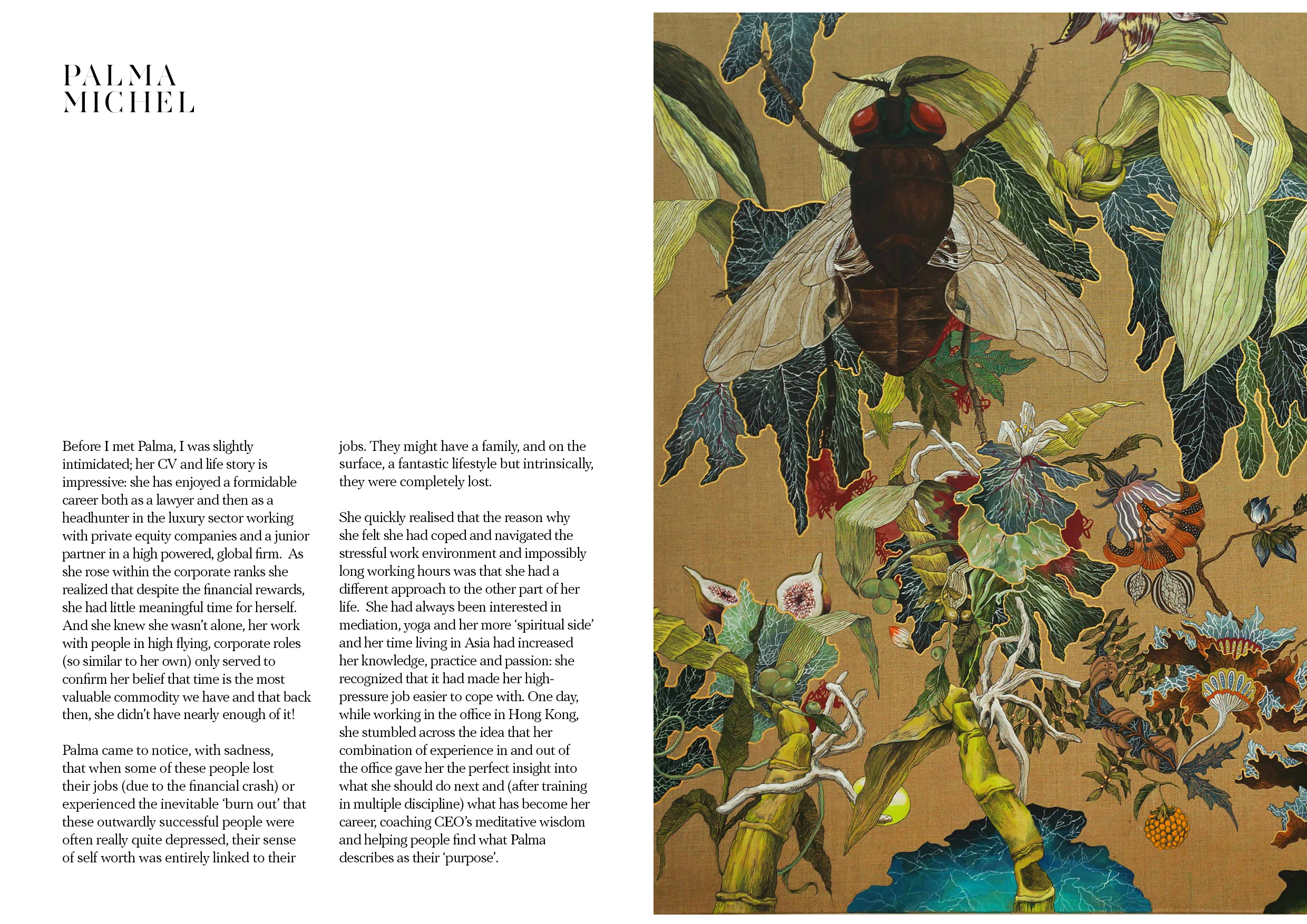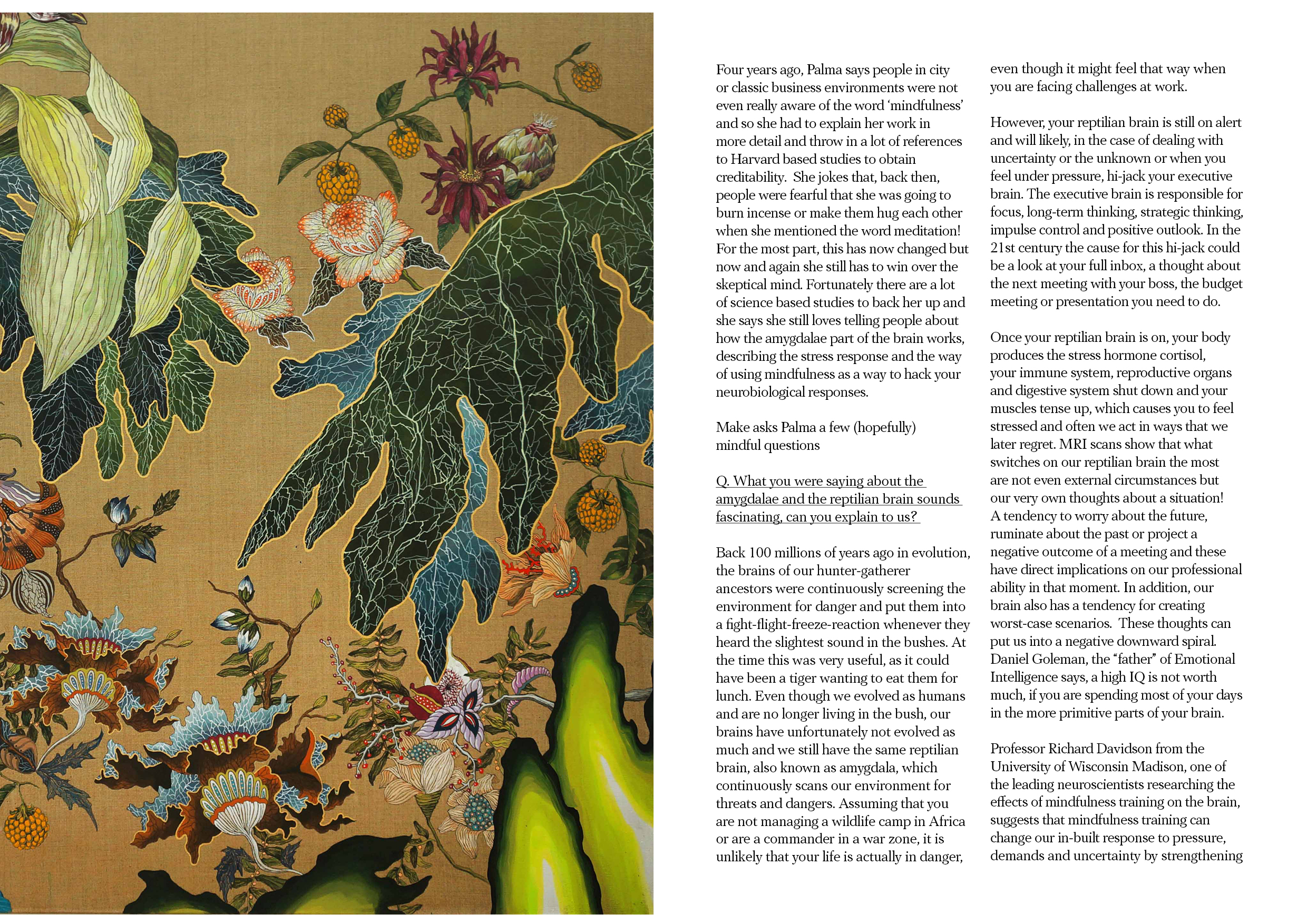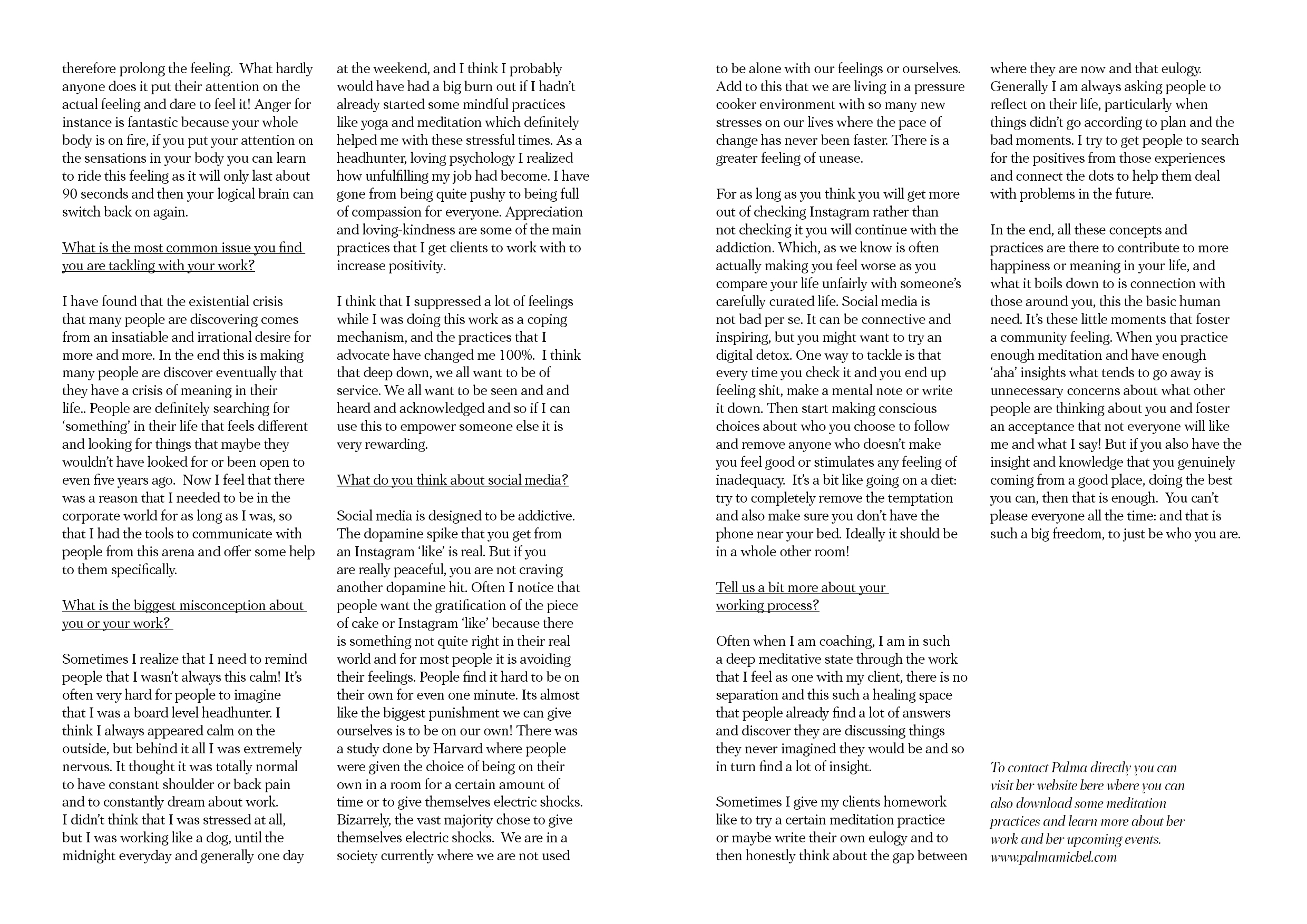MIND BENDING
Interview by Ursula Lake
Illustrations by Soo young Chung
Make talks to mindful leadership advisor and executive coach, Palma Michel about the disciplines that changed her life and how she is helping others by teaching them the same skills.
Before I met Palma, I was slightly intimidated! Both her CV and life story are impressive: she has enjoyed a formidable career both as a lawyer and then as a headhunter in the luxury sector working with private equity companies and a junior partner in a high powered, global firm. As she rose within the corporate ranks she realized that despite financial rewards, she had little meaningful time for herself. And she knew she wasn’t alone, her work with people in high flying, corporate roles (so similar to her own) only served to confirm her belief that time is the most valuable commodity we have and that back then, she didn’t have nearly enough of it!
Palma came to notice, with sadness, that when some of these people lost their jobs (due to the financial crash) or experienced the inevitable ‘burn out’ that these outwardly successful people were often really quite depressed, their sense of self-worth was entirely linked to their jobs. They might have a family, and on the surface, a fantastic lifestyle but intrinsically, they were completely lost.
She quickly realised that the reason why she felt she had coped and navigated the stressful work environment and impossibly long working hours was that she had a different approach to the other part of her life. She had always been interested in meditation, yoga and her more ‘spiritual side’ and her time living in Asia had increased her knowledge, practice and passion: she recognized that it had made her high-pressure job easier to cope with. One day, while working in the office in Hong Kong, she stumbled across the idea that her combination of experience in and out of the office gave her the perfect insight into what she should do next and (after training in multiple disciplines) what has become her career, coaching CEO’s meditative wisdom and helping people find what Palma describes as their ‘purpose’.
Four years ago, Palma says people in city or classic business environments were not even really aware of the word ‘mindfulness’ and so she had to explain her work in more detail and throw in a lot of references to Harvard based studies to obtain creditability. She jokes that, back then, people were fearful that she was going to burn incense or make them hug each other when she mentioned the word meditation! For the most part, this has now changed but now and again she still has to win over the sceptical mind. Fortunately, there are a lot of science-based studies to back her up and she says she still loves telling people about how the amygdalae part of the brain works, describing the stress response and the way of using mindfulness as a way to hack your neurobiological responses.
Make asks Palma a few (hopefully) mindful questions
Q. What you were saying about the amygdalae and the reptilian brain sounds fascinating, can you explain to us?
A. Back 100 millions of years ago in evolution, the brains of our hunter-gatherer ancestors were continuously screening the environment for danger and put them into a fight-flight-freeze-reaction whenever they heard the slightest sound in the bushes. At the time this was very useful, as it could have been a tiger wanting to eat them for lunch. Even though we evolved as humans and are no longer living in the bush, our brains have unfortunately not evolved as much and we still have the same reptilian brain, also known as the amygdala, which continuously scans our environment for threats and dangers. Assuming that you are not managing a wildlife camp in Africa or are a commander in a war zone, it is unlikely that your life is actually in danger, even though it might feel that way when you are facing challenges at work.
However, your reptilian brain is still on alert and will likely, in the case of dealing with uncertainty or the unknown or when you feel under pressure, hi-jack your executive brain. The executive brain is responsible for focus, long-term thinking, strategic thinking, impulse control and positive outlook. In the 21st century, the cause for this hi-jack could be a look at your full inbox, a thought about the next meeting with your boss, the budget meeting or presentation you need to do.
Once your reptilian brain is on, your body produces the stress hormone cortisol, your immune system, reproductive organs and digestive system shut down and your muscles tense up, which causes you to feel stressed and often we act in ways that we later regret. MRI scans show that what switches on our reptilian brain the most are not even external circumstances but our very own thoughts about a situation! A tendency to worry about the future, ruminate about the past or project a negative outcome of a meeting and these have direct implications on our professional ability at that moment. In addition, our brain also has a tendency for creating worst-case scenarios. These thoughts can put us into a negative downward spiral. Daniel Goleman, the “father” of Emotional Intelligence says, a high IQ is not worth much if you are spending most of your days in the more primitive parts of your brain.
Professor Richard Davidson from the University of Wisconsin Madison, one of the leading neuroscientists researching the effects of mindfulness training on the brain, suggests that mindfulness training can change our inbuilt response to pressure, demands and uncertainty by strengthening our executive brain and by increasing the white matter between the amygdala and the executive brain.
Q. The theme of this issue is Obsession, how do you help people with obsessive or addictive behaviour patterns with your work
A. What I find is that the addictive or obsessive behaviours are generally a cover-up for some other sadness and so we find ways that through a variety of processes to work through that and come up with a clear idea of what the root of the problem really is and work with that.
The first step is to admit any obsessive behaviour. Admit the problem and then break it down to the trigger and then the reward. It can help to write a trigger journal of the things that are making you do something in a nonjudgmental way and then notice the emotions that surround that. Are you addicted to your phone, and look at it a lot on at train commute that you hate? Identify the feeling around the action and discover whether instead of numbing it with eating or social media fixes or alcohol, can you sit with the emotion and endure it? Can I bring curiosity to it? Do I need to have a breathing break before I take the action fueled by the emotion? Often a break just to take a few slow breaths between the birth of the desire to do something and acting on it can be really powerful as you get a chance to switch off the reptilian, impulsive brain and switch on the executive brain and then you can make a conscious choice.
Q. Can obsession ever be considered to be healthy?
A. The only way I think obsession is healthy is if you are learning something new as it can speed up your learning process enormously. It can help you to get into the flow state. But is obsession ever relaxing for your body or good? I would say no because it causes stress in the body. Even if you are obsessing over something that is positive or healthy, the fact that you are overthinking about it and obsessing is taking you away from your peace.
Q.What are some quick, mindful ideas to try to help someone get out an obsessive state?
A. Let’s say you are obsessing over food, I would where do I feel the obsessing or craving in my body. How does it really feel? What is that feeling? Is there a feeling behind it? Am I really tired or frustrated? To bring a curiosity to the idea of your physical hunger and to try to identify what it really is. The aim is to cut through the automatic pilot behaviour and reflect on maybe the root cause. Is it actually that you are ruminating over a bad conversation you had with your boss or your partner and you want to numb that feeling with food?
Another tactic is to say to try to step outside of yourself and observe these feelings. Have a conversation: ‘Okay, I see you, and I allow you to be here’. Consciously decide weather hunger really plays a part in what you are feeling and move away from the fight going on your head to a more peaceful place of acceptance where you don’t have the need to distract yourself with food or social media or whatever the numbing, destructive behaviour is.
In those moments, what is happening is that you are having thoughts about the situation, maybe anger or fear and what most people do is put all of their focus on the story going on their head and therefore prolong the feeling. What hardly anyone does it put their attention on the actual feeling and dare to feel it! Anger, for instance, is fantastic because your whole body is on fire, if you put your attention on the sensations in your body you can learn to ride this feeling as it will only last about 90 seconds and then your logical brain can switch back on again.
Q. What is the most common issue you find you are tackling with your work?
A. I have found that the existential crisis that many people are discovering comes from an insatiable and irrational desire for more and more. In the end, this is making many people are discovering eventually that they have a crisis of meaning in their life.. People are definitely searching for ‘something’ in their life that feels different and looking for things that maybe they wouldn’t have looked for or been open to even five years ago. Now I feel that there was a reason that I needed to be in the corporate world for as long as I was so that I had the tools to communicate with people from this arena and offer some help to them specifically.
Q.What is the biggest misconception about you or your work?
A. Sometimes I realize that I need to remind people that I wasn’t always this calm! It’s often very hard for people to imagine that I was a board level headhunter. I think I always appeared calm on the outside, but behind it all, I was extremely nervous. It thought it was totally normal to have constant shoulder or back pain and to constantly dream about work. I didn’t think that I was stressed at all, but I was working like a dog, until the midnight every day and generally one day at the weekend, and I think I probably would have had a big burn out if I hadn’t already started some mindful practices like yoga and meditation which definitely helped me with these stressful times. As a headhunter, loving psychology I realized how unfulfilling my job had become. I have gone from being quite pushy to being full of compassion for everyone. Appreciation and loving-kindness are some of the main practices that I get clients to work with to increase positivity.
I think that I suppressed a lot of feelings while I was doing this work as a coping mechanism, and the practices that I advocate have changed me 100%. I think that deep down, we all want to be of service. We all want to be seen and heard and acknowledged and so if I can use this to empower someone else it is very rewarding.
Q. What do you think about social media?
A. Social media is designed to be addictive. The dopamine spike that you get from an Instagram ‘like’ is real. But if you are really peaceful, you are not craving another dopamine hit. Often I notice that people want the gratification of the piece of cake or Instagram ‘like’ because there is something not quite right in their real world and for most people, it is avoiding their feelings. People find it hard to be on their own for even one minute. It’s almost like the biggest punishment we can give ourselves is to be on our own! There was a study done by Harvard where people were given the choice of being on their own in a room for a certain amount of time or to give themselves electric shocks. Bizarrely, the vast majority chose to give themselves electric shocks. We are in a society currently where we are not used to be alone with our feelings or ourselves. Add to this that we are living in a pressure cooker environment with so many new stresses on our lives where the pace of change has never been faster. There is a greater feeling of unease.
For as long as you think you will get more out of checking Instagram rather than not checking it you will continue with the addiction. Which, as we know is often actually making you feel worse as you compare your life unfairly with someone’s carefully curated life. Social media is not bad per se. It can be connective and inspiring, but you might want to try a digital detox. One way to tackle is that every time you check it and you end up feeling shit, make a mental note or write it down. Then start making conscious choices about who you choose to follow and remove anyone who doesn’t make you feel good or stimulates any feeling of inadequacy. It’s a bit like going on a diet: try to completely remove the temptation and also make sure you don’t have the phone near your bed. Ideally, it should be in a whole other room!
Q. Tell us a bit more about your working process?
A. Often when I am coaching, I am in such a deep meditative state through the work that I feel as one with my client, there is no separation and this such a healing space that people already find a lot of answers and discover they are discussing things they never imagined they would be and so, in turn, find a lot of insight.
Sometimes I give my clients homework like to try a certain meditation practice or maybe write their own eulogy and to then honestly think about the gap between where they are now and that eulogy. Generally, I am always asking people to reflect on their lives, particularly when things didn’t go according to plan and the bad moments. I try to get people to search for the positives from those experiences and connect the dots to help them deal with problems in the future.
In the end, all these concepts and practices are there to contribute to more happiness or meaning in your life, and what it boils down to is a connection with those around you, this the basic human need. It’s these little moments that foster a community feeling. When you practice enough meditation and have enough ‘aha’ insights what tends to go away is unnecessary concerns about what other people are thinking about you and foster an acceptance that not everyone will like me and what I say! But if you also have the insight and knowledge that you genuinely coming from a good place, doing the best you can, then that is enough. You can’t please everyone all the time: and that is such a big freedom, to just be who you are.
To contact Palma directly you can visit her website here where you can also download some meditation practices and learn more about her work and her upcoming events.
Soo young Chung, the artist behind the illustrations, comes from Seoul and is currently in London where she is finishing an MA at the Royal College of Art. You can see more of her work and find out about her upcoming exhibitions at
www.chungsooyoung.com




